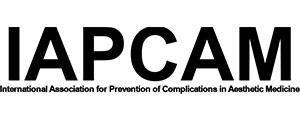VOLTAR
IMCAS World Congress 2023
IMCAS World Congress 2023
Programa
S104, S105
Injection techniques & avoiding complications (in collaboration with IAPCAM)
Sala: Room 151 - Level 1
Data: sexta-feira 27 janeiro 2023 de 10:30 às 12:30
Formato: FOCUS SESSION > lectures covering a major topic of the congress
Data: sexta-feira 27 janeiro 2023 de 10:30 às 12:30
Formato: FOCUS SESSION > lectures covering a major topic of the congress
Apresentações desta sessão
| Horas | Palestrantes | Título da apresentação | Resumo | Número |
| 10:30 | Introduction | 120511 | ||
| 10:32 | Needle vs cannula: which is truly safe? | 120512 | ||
| 10:43 | The origin of soft tissue filler adverse events | 120516 | ||
| 10:54 | The impact of face assessment on preventing aesthetic complications in HA treatments | 120515 | ||
| 11:05 | Topical hyaluronidase: breakthrough technology to optimize the appearance of HA injected skin (educational grant from Prollenium) | 120514 | ||
| 11:16 | Methotrexate protocol for treating Covid vaccine nodules | Visualizar | 121693 | |
| 11:27 | Complications with energy devices | 121806 | ||
| 11:38 | Hyperbaric oxygen therapy for complications management in aesthetic medicine | 120513 | ||
| 11:49 | Blindness associated with dermal fillers B.A.D: time to act now | 120517 | ||
| 12:00 | Is intra-arterial injection using thrombolytic agents and hyaluronidase safe and efficient in HA filler induced embolism of ophthalmic and cerebral arteries? | Visualizar | 122401 | |
| 12:11 | Discussion and Q&A | 120519 | ||


















